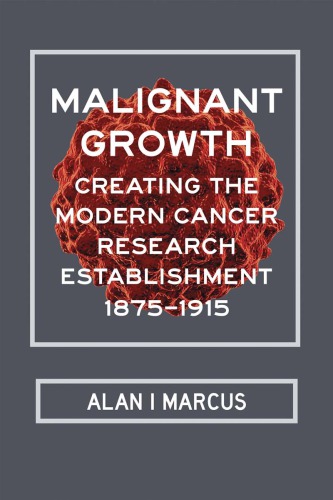Product desciption
Malignant Growth Creating The Modern Cancer Research Establishment 18751915 Alan I Marcus by Alan I Marcus 9780817319793, 0817319794 instant download after payment.
An examination of the first attempt to conquer cancer in the late nineteenth and early twentieth centuries.
In Malignant Growth: Creating the Modern Cancer Research Establishment, 1875–1915, Alan I Marcus explores a relatively understudied period in the history of cancer by providing a careful investigation of the first public crusade to determine the cause of cancer. The search for cancer’s cause during the heady era of bacteriology was colored by the Germ Theory of Disease. Researchers had demonstrated in malady after malady that each disease was the result of a singular and specific pathogenic agent. That model led investigators to optimistically conclude that they would soon find the cause of what was termed the “emperor of all maladies,” cases of which were apparently increasing at a prodigious rate worldwide.
In this accessible history of science and medicine, Marcus exposes the complex story of the efforts made from 1875 through 1915 to first conquer and, failing that, to control cancer—a dual approach that remains in force to this day. He reveals the messiness of real-time scientific research, tracing the repeated lurches of promise, discoveries of hope, and the inevitable despair that always followed. Other barriers existed to the research, such as inconsistency in test standards and inter-laboratory competition and mistrust. Researchers approached cancer from such disparate specialties as clinical medicine, zoology, botany, chemistry, nutrition, bacteriology, pathology, and microbiology. Although they came from diverse fields, each steadfastly maintained that cancer operated in an analogous fashion to other bacteriological diseases.
Virtually every country and a slew of various clinicians and investigators waged this first war on cancer, operating in remarkably diverse scientific venues. Cancer laboratories and hospitals, as well as organizations like the American Cancer Society, were born out of this first offensive on cancer. Even as cancer continues to proliferate today, these institutions that initially formed to defeat cancer more than a hundred years ago persist and continue to expand.
Alan I Marcus is the William L. Giles Distinguished Professor of History at Mississippi State University. He is the chair of the history department there and also served as the interim chair of the chemistry department while writing this book. He is the author of Cancer from Beef: DES, Federal Food Regulation, and Consumer Confidence.
"This book is a careful and interesting investigation of a topic that has been much ignored. The work definitely has implication for what we are doing today in cancer research."
—K. Codell Carter, author of The Rise of Causal Concepts of Disease


